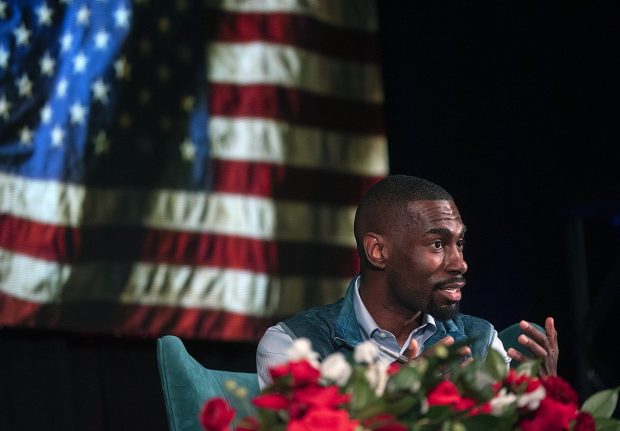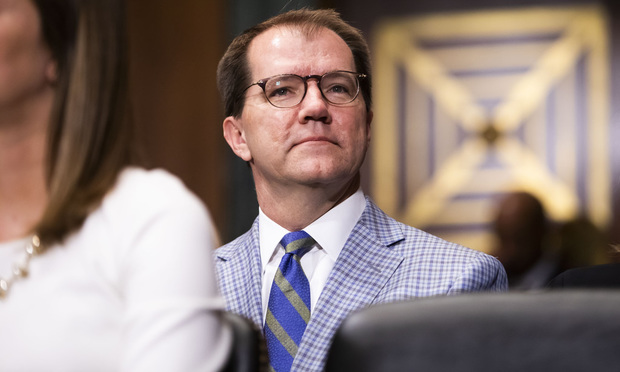Nationwide Protests May Resound in Supreme Court First Amendment Case
The petition from a Black Lives Matter leader, DeRay Mckesson, takes on new importance amid the national protests that followed the death of George Floyd in the custody of police in Minneapolis.
June 09, 2020 at 01:15 PM
7 minute read
 Black Lives Matter organizer DeRay Mckesson discusses charges of police misconduct and racial tension at The Summit on Race in America on April 8, 2019, at the LBJ Presidential Library. Photo: Jay Godwin/Wikimedia Commons.
Black Lives Matter organizer DeRay Mckesson discusses charges of police misconduct and racial tension at The Summit on Race in America on April 8, 2019, at the LBJ Presidential Library. Photo: Jay Godwin/Wikimedia Commons.
The U.S. Supreme Court will soon consider a petition that pits police against a leader of the Black Lives Matter movement in a dispute over the First Amendment rights of assembly, petition and speech.
But the case, Mckesson v. Doe, does not arise from the nationwide protests of recent weeks. Instead, it dates back to a 2016 protest in Baton Rouge, Louisiana, triggered by the death of Alton Sterling, an African American man shot and killed at close range by police responding to an anonymous 911 call. Among other themes, demonstrators chanted "Black Lives Matter" as they protested against the police conduct.
During the demonstration, an unidentified person threw a rock and injured an unnamed Baton Rouge police officer. The officer, referred to as "John Doe," filed a lawsuit against DeRay Mckesson, a Black Lives Matter movement organizer.
Mckesson was a leader of the protest but was not the person who injured the officer. Nonetheless, the U.S. Court of Appeals for the Fifth Circuit ruled last December that the lawsuit could proceed against Mckesson.
The dispute may sound small-gauged for Supreme Court status, but First Amendment advocates and the American Civil Liberties Union have framed it as a major cause. They assert that upholding the Fifth Circuit could result in chilling the right to assemble and petition by opening the door to nuisance lawsuits against protest leaders for injuries they did not cause.
And the case takes on new importance amid the widespread protests that followed the May 25 death of George Floyd in the custody of police in Minneapolis, which may spur similar litigation.
When the Fifth Circuit ruled in the Mckesson case in December, ACLU national legal director David Cole said, "If the law had allowed anyone to sue leaders of social justice movements over the violent actions of others, there would have been no civil rights movement. The lower court's ruling is a threat to the First Amendment rights of millions of Americans."
The ACLU joined David Goldberg of Donahue, Goldberg, Weaver & Littleton in Mckesson's petition filed in March.
Media lawyer Floyd Abrams, a senior counsel at Cahill Gordon & Reindel, said, "the Mckesson case addresses the issue of whether the organizer of a lawful protest can be held personally liable for the misconduct of one of the protestors. If that were the case, the right to protest could far too easily and routinely be stifled."
Abrams is one of several First Amendment advocates and scholars who joined a friend of the court brief in support of McKesson. The brief emphasizes that "Officer Doe is entitled to recover for his injury. But his remedy is owed by the rock thrower, not Mckesson."
Nicole Ligon, supervising attorney of the First Amendment Clinic at Duke Law School, which worked on the First Amendment brief, sees a connection with the recent uprising. Ligon added, "To hold organizers accountable for the actions of anyone near the scene of their organized protest—even when those organizers did not condone or encourage such conduct—is to risk the right to protest that is essential to this country."
Kailee Scales, managing director Black Lives Matter Global Network, also said, "Thousands of Americans across the country have already brought about political change by protesting the systemic racism faced by Black Americans. The Supreme Court should make sure that protesters and community organizers are not deterred by baseless lawsuits from the vital work of advocating for Black lives."
The main Supreme Court precedent that lawyers for Mckesson are pointing to is NAACP v. Claiborne Hardware, a 1982 decision that invoked the First Amendment to protect nonviolent protesters from being sued.
Merchants in Claiborne County, Mississippi, sued the NAACP in 1966 for mounting a boycott of white-owned stores that hurt their businesses. Acts of violence also occurred, and the high court said those who were harmed by the violence could sue. But the organizers of the protest could not be sued, the court ruled.
"Through exercise of their First Amendment rights of speech, assembly, association and petition, rather than through riot or revolution, petitioners sought to bring about political, social and economic change," the late Justice John Paul Stevens wrote for the majority. He added, "The right to associate does not lose all constitutional protection merely because some members of a group may have participated in conduct … that itself is not protected."
The Claiborne Hardware case became a key precedent at a time when segregationists used litigation to cripple the civil rights movement.
When lawyers for Mckesson countered the officer's lawsuit, a federal district judge sided with Mckesson, citing the Claiborne case. The case then went to the U.S. Court of Appeals for the Fifth Circuit, which ruled against Mckesson, finding that the First Amendment did not make him immune from being sued.
 Judge Don Willett. Photo: Diego M. Radzinschi / NLJ
Judge Don Willett. Photo: Diego M. Radzinschi / NLJThe appeals court reviewed the case again and came to the same conclusion. But in December 2019, the court issued yet another ruling, this time because Judge Don Willett, one of the Fifth Circuit judges who ruled earlier, changed his mind.
"Unquestionably, Officer Doe can sue the rock thrower. But I am unconvinced he can sue the protest leader," Willett stated. The Claiborne precedent "foreclosed squarely" the notion that Mckesson could be sued, he said.
"In America, political uprisings, from peaceful picketing to lawless riots, have marked our history from the beginning—indeed, from before the beginning," Willett wrote. "The Sons of Liberty were dumping tea into Boston Harbor almost two centuries before Dr. King's Selma-to-Montgomery march (which, of course, occupied public roadways, including the full width of the bloodied Edmund Pettus Bridge)."
The Supreme Court was scheduled May 15 to consider whether to take up the Mckesson case, but that was postponed to give the police officer's lawyers more time to respond to Mckesson's briefs. The petition may be considered this month or later in the summer.
Baton Rouge lawyer Donna Grodner, who represents the John Doe police officer, said in her brief, "When a demonstration that is lawful and peaceful and thus constitutionally protected (as expression, association, assembly, or petition), transforms into an unlawful, unpeaceful, and dangerous activity … does the First Amendment protect the leader of that illegal activity from the reasonably foreseeable consequences of his own negligent, illegal, and dangerous activity under ordinary tort law? No."
Read more:
Trump DOJ's Retreat From Police Investigations Draws New Scrutiny
'A Seminal Moment': Black Law Firm Leaders on Inequity, Ire and What Comes Next
'Our Moral Imperative': Washington Justices Issue Call to Action for Lawyers
Civil Rights Lawyers Confront Pandemic and Police Violence Inequities
Trump, Barr Sued for Use of Force Against Lafayette Square Demonstrators
At Supreme Court, Sotomayor Is Leading Voice Against Alleged Police Abuses
This content has been archived. It is available through our partners, LexisNexis® and Bloomberg Law.
To view this content, please continue to their sites.
Not a Lexis Subscriber?
Subscribe Now
Not a Bloomberg Law Subscriber?
Subscribe Now
NOT FOR REPRINT
© 2025 ALM Global, LLC, All Rights Reserved. Request academic re-use from www.copyright.com. All other uses, submit a request to [email protected]. For more information visit Asset & Logo Licensing.
You Might Like
View All
Apple Files Appeal to DC Circuit Aiming to Intervene in Google Search Monopoly Case
3 minute read
DC Circuit Revives Firefighters' Religious Freedom Litigation in Facial Hair Policy Row
3 minute read
Judges Split Over Whether Indigent Prisoners Bringing Suit Must Each Pay Filing Fee

4th Circuit Upholds Virginia Law Restricting Online Court Records Access
3 minute readLaw Firms Mentioned
Trending Stories
- 1Which Legal Tech Jobs Are on the Rise, and Which Aren't, with Jared Coseglia
- 2Absent Explicit Agreement, Court Rejects Unilateral Responsiveness Redaction of Text Messages
- 3SEC Whistleblower Program: What to Expect Under the Trump Administration
- 4Sidley Hires Paul Hastings Energy Finance Partner in Houston
- 5Potential Pitfalls in Arbitrating Religious Disputes
Who Got The Work
J. Brugh Lower of Gibbons has entered an appearance for industrial equipment supplier Devco Corporation in a pending trademark infringement lawsuit. The suit, accusing the defendant of selling knock-off Graco products, was filed Dec. 18 in New Jersey District Court by Rivkin Radler on behalf of Graco Inc. and Graco Minnesota. The case, assigned to U.S. District Judge Zahid N. Quraishi, is 3:24-cv-11294, Graco Inc. et al v. Devco Corporation.
Who Got The Work
Rebecca Maller-Stein and Kent A. Yalowitz of Arnold & Porter Kaye Scholer have entered their appearances for Hanaco Venture Capital and its executives, Lior Prosor and David Frankel, in a pending securities lawsuit. The action, filed on Dec. 24 in New York Southern District Court by Zell, Aron & Co. on behalf of Goldeneye Advisors, accuses the defendants of negligently and fraudulently managing the plaintiff's $1 million investment. The case, assigned to U.S. District Judge Vernon S. Broderick, is 1:24-cv-09918, Goldeneye Advisors, LLC v. Hanaco Venture Capital, Ltd. et al.
Who Got The Work
Attorneys from A&O Shearman has stepped in as defense counsel for Toronto-Dominion Bank and other defendants in a pending securities class action. The suit, filed Dec. 11 in New York Southern District Court by Bleichmar Fonti & Auld, accuses the defendants of concealing the bank's 'pervasive' deficiencies in regards to its compliance with the Bank Secrecy Act and the quality of its anti-money laundering controls. The case, assigned to U.S. District Judge Arun Subramanian, is 1:24-cv-09445, Gonzalez v. The Toronto-Dominion Bank et al.
Who Got The Work
Crown Castle International, a Pennsylvania company providing shared communications infrastructure, has turned to Luke D. Wolf of Gordon Rees Scully Mansukhani to fend off a pending breach-of-contract lawsuit. The court action, filed Nov. 25 in Michigan Eastern District Court by Hooper Hathaway PC on behalf of The Town Residences LLC, accuses Crown Castle of failing to transfer approximately $30,000 in utility payments from T-Mobile in breach of a roof-top lease and assignment agreement. The case, assigned to U.S. District Judge Susan K. Declercq, is 2:24-cv-13131, The Town Residences LLC v. T-Mobile US, Inc. et al.
Who Got The Work
Wilfred P. Coronato and Daniel M. Schwartz of McCarter & English have stepped in as defense counsel to Electrolux Home Products Inc. in a pending product liability lawsuit. The court action, filed Nov. 26 in New York Eastern District Court by Poulos Lopiccolo PC and Nagel Rice LLP on behalf of David Stern, alleges that the defendant's refrigerators’ drawers and shelving repeatedly break and fall apart within months after purchase. The case, assigned to U.S. District Judge Joan M. Azrack, is 2:24-cv-08204, Stern v. Electrolux Home Products, Inc.
Featured Firms
Law Offices of Gary Martin Hays & Associates, P.C.
(470) 294-1674
Law Offices of Mark E. Salomone
(857) 444-6468
Smith & Hassler
(713) 739-1250








